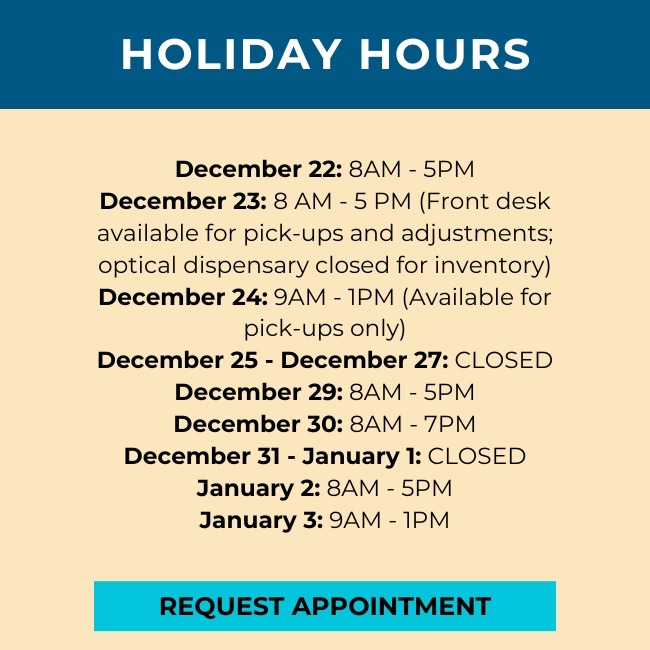Vision is something most people don’t think about until it starts to change. Often, those changes happen gradually, making it easy to overlook symptoms that could indicate a need for corrective lenses. Sometimes you can tell by frequent headaches, blurry vision, or tired eyes after a long day that you might need glasses.
Learning to recognize the signs of changing vision can help you protect your eye health and avoid unnecessary strain. And when questions arise about whether glasses might help, a comprehensive eye exam is the best place to start.
Signs You May Need Glasses
Your vision can change over time, making it hard to notice subtle shifts in eyesight. Paying attention to certain symptoms and maintaining regular eye exams is essential, not only for clarity of vision, but for your total wellness. Eye exams can reveal a need for new glasses and signal underlying conditions or health problems that require professional attention.
Regular checks of your vision health can help you maintain optimal health. Don’t wait until vision problems significantly impact your daily life; early detection is key.
Blurry Vision & Trouble Focusing
One of the most common signs that it might be time for glasses is blurry vision. Depending on the type of refractive error, that blurriness may affect your distance vision, your near vision, or both. Vision that once felt crisp may now seem fuzzy or distorted.
You may notice:
- Letters blending together when reading
- Difficulty seeing distant road signs while driving
- Needing to hold your phone or book farther away than usual
- A general sense that your eyes can’t quite “lock in” on what you’re trying to see
These changes can point to myopia (nearsightedness), hyperopia (farsightedness), or astigmatism. Glasses help correct how light focuses on the retina, improving clarity and reducing the effort of your eyes.
Frequent Headaches
Recurring headaches, especially those that occur after reading, using a computer, or concentrating, can be linked to vision problems. When your eyes are working overtime to compensate for vision changes, the muscles around them can become strained, leading to discomfort.
These headaches are often dull and tend to appear around the temples, forehead, or behind the eyes. If you’re experiencing them more often than usual, it could be a sign your eyes are struggling to keep up.
Eye Strain & Fatigue
Tired, sore eyes at the end of the day may seem normal, but they’re often a red flag. Eye strain, also known as asthenopia, occurs when your eyes are overworked, particularly during tasks that require prolonged focus.
You may notice:
- A burning or itchy feeling in your eyes
- Difficulty keeping your eyes open late in the day
- A sensation of pressure behind or around the eyes
- Increased light sensitivity
These symptoms are common in those who spend long hours reading, driving, or working at a computer. Glasses prescribed for your specific visual needs can reduce this fatigue and help you feel more comfortable throughout the day.
Squinting
Squinting is one of the body’s natural responses to unclear vision. It briefly changes the shape of the eye to help focus light more effectively. If you find yourself squinting to read signs, see presentations, or watch television, that’s a sign your eyes might need a little help.
Children who need glasses often squint without realizing it. Adults, too, may do it subconsciously while trying to read or focus on something across the room. While it may improve vision temporarily, frequent squinting can lead to additional eye strain and headaches.
Trouble Seeing at Night
Night vision tends to decline with age, but if you’re experiencing sudden or ongoing difficulty seeing in low-light settings, it’s time to get your eyes checked. Many people who need glasses report that night driving becomes more challenging, particularly due to glare from headlights or difficulty reading road signs.
Watch for:
- Halos or glare around lights at night
- Increased reliance on overhead lights at home
- Feeling uncomfortable or anxious driving in the dark
Poor night vision can indicate uncorrected vision problems or a need for updated lenses.
Screen-Related Discomfort
With more people spending their days in front of screens, symptoms of digital eye strain are becoming increasingly common. Even if you don’t currently wear glasses, screen use can reveal underlying vision issues that become more noticeable over time.
You might experience:
- Blurry or fluctuating vision after long screen sessions
- Dry eyes or frequent blinking
- Neck or shoulder tension from leaning closer to the screen
- Difficulty switching focus between distances
Specialized computer glasses or updated prescriptions can help minimize these effects, making daily screen use more manageable.
Vision Concerns in Children
Children often don’t recognize when something is wrong with their vision. Since they might assume everyone sees the way they do, it’s up to adults to spot the warning signs.
Common indicators include:
- Sitting very close to the TV or computer
- Covering one eye while reading
- Struggling to focus or losing their place on the page
- Avoiding activities that require near or far vision
One of the most important reasons to have your child’s eyes examined early is to detect amblyopia, or “lazy eye.” If left untreated in childhood, amblyopia can result in permanent, irreversible vision loss. Early detection and treatment are critical to prevent long-term issues and preserve healthy vision.
The Importance of an Eye Exam
While self-assessing these signs can be helpful, it isn’t a substitute for a proper diagnosis. A comprehensive eye exam can be the best way to determine whether you need glasses and what kind of lenses will best support your visual needs. The exam will assess your clarity of vision, the coordination of your eyes, and the overall health of your eyes.
Early detection of vision changes doesn’t just improve comfort; it also helps identify other potential concerns, such as myopia, presbyopia, or signs of eye disease. Regular eye exams enable optometrists to monitor your vision over time and offer guidance on the most effective solutions.
Book Your Exam at Stoney Creek Optometry
If you’ve been dealing with blurry vision, sore eyes, or headaches, it may be time to explore whether glasses could help. Our team at Stoney Creek Optometry offers comprehensive eye exams for all ages, combining decades of experience with innovative diagnostic technology. Our friendly, welcoming approach makes it easy to get the answers you need, whether you’re booking for yourself or your family.






















